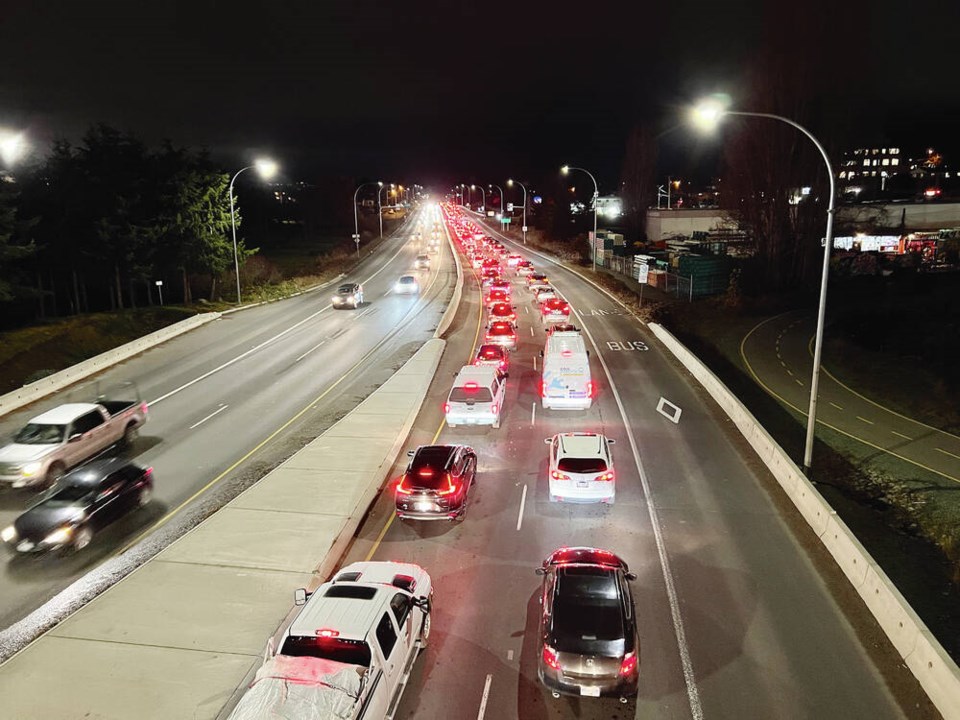If the week of July 5 to 10 is a barometer, it’s going to be an appalling summer for driver safety in this province. The toll for that week was 19 dead. Many more were injured, along with a cost of probably hundreds of thousands of dollars in property damage — not to mention the traffic delays and the additional strain on our already strained emergency response systems.
Let’s not forget the survivors either. Families have been wiped out and others forever scarred from the loss of those near and dear.
Why does this keep happening? According to ICBC, fatal crashes rise by 27% over the summer period. In some ways it makes sense. There are more people on the roads, increasing the chances of conflict simply because of increased volume.
This carnage, though, always comes back to three main reasons: speed; distracted driving; and alcohol or drug intoxication.
What is it about those three demons that many drivers can’t shake?
Many drivers believe that speeding gets you there faster. Sorry to burst your bubble, but according to the journal Accident Analysis and Prevention, a regularly speeding driver actually saves 26 seconds per day. That’s a whopping two minutes per week.
Speeding also comes into play when drivers lose perspective on their environment — like trying to keep up with traffic — or let their guard down on long empty highways where “your speed doesn’t really matter out here.”
Some drivers are just plain aggressive. As I’ve written about recently, they don’t care about consequences and have little, if any, regard for others on the road. Their objective is to get there fast and beat you in the process.
Next up is distracted driving, one of the greatest banes of the digital era. The chance of causing a crash is increased 3.6 times when a driver uses an electronic device behind the wheel. Yet distraction always makes the top 3 in causing highway deaths while causing 1.6 million crashes annually, according to the Canadian Automobile Association.
Yet it seems that no amount of enforcement or education campaigns can make some drivers put the phone down. How has a text or a social media post become more important than a human life?
For one, I believe that we’ve been enslaved by electronic communication. Since the advent of the telephone we’ve been trained to believe that any call is highly important. Couple that with the addictive nature of modern smartphones and their gateway to news, social events and personal chat threads. We’re now socialized to respond instantly for fear of missing out. The need to urgently respond has become a deadly habit.
While phones are now probably the root of the distracted driving problem, there are certainly other reasons for drivers becoming distracted. Simply having a conversation with a passenger can take your eyes and often your mind off of the road. Flipping radio stations or song tracks only takes seconds, but if you’re doing 100 km/h, those two seconds of distraction mean you’ve travelled about 58 metres — over half the length of a football field.
Finally, there’s impaired driving. Summertime means more partying, outdoor recreation and social time. Often it involves driving somewhere to partake. As I’ve written about many times, alcohol impairs the two things you need the most as a driver: reaction time and judgment.
Numerous studies have been conducted worldwide to try to understand why people drive drunk, despite knowing the potential outcomes. There are about four basic reasons.
Drivers consistently underestimate the effect that even a few drinks have upon them. While they may feel fine, their motor skills are blunted while their perception of the driving environment has been reshaped. Many drivers proclaim they actually drive better after a few drinks.
Unfortunately, there is a low risk of being caught when you’re impaired. Policing resources are stretched to the limit and traffic enforcement suffers as a result. Accordingly, many drivers see that low catch risk as an opportunity. When taxis are also hard to come by at peak hours and there is a fear of leaving the car in a different part of town, the urge to take the risk is increased.
Pride also plays a key role in the decision to drive drunk. Many drivers are too embarrassed to admit they’ve had too many, play down their intoxication, then slip behind the wheel to show others “I’m fine.” This type of peer pressure is most apparent for males aged 19-35.
Nineteen people set out on the road last week believing nothing could happen to them. Alcohol, speeding and distraction proved otherwise. I’m worried now about what the final toll will be in B.C.’s long hot summer of 2024.



